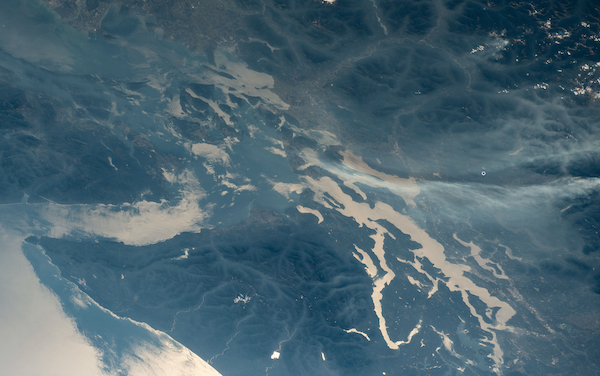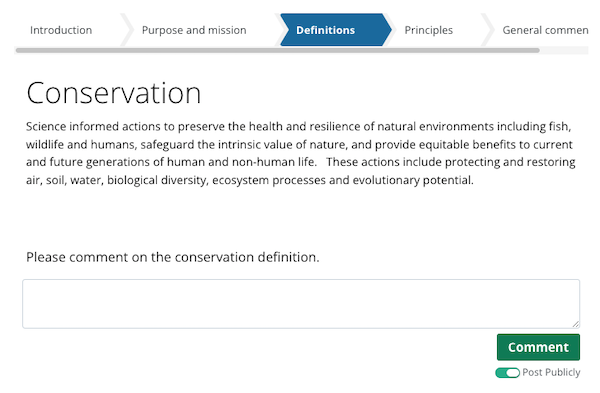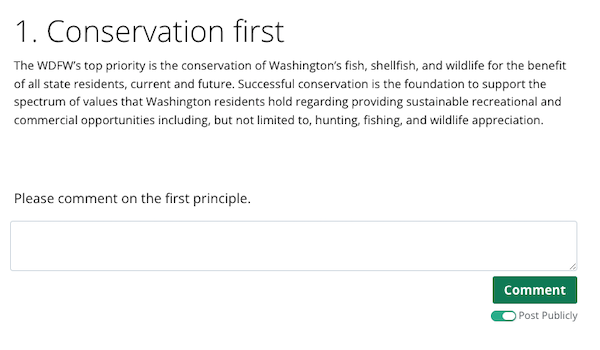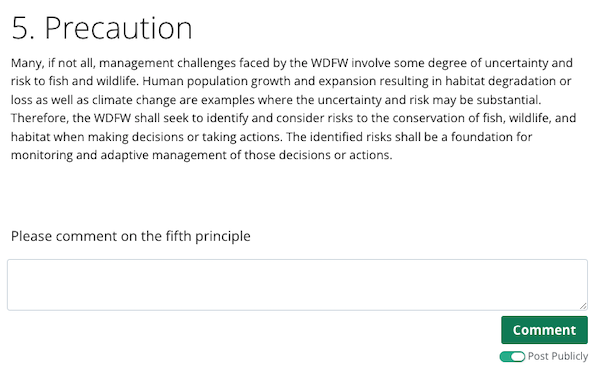
Commission’s WDFW Draft Conservation Policy Out For Comment
Public comment is now open on the draft of a controversial new conservation policy for the Washington Department of Fish and Wildlife, a document with “hot buttons in every paragraph,” as one of its primary writers has acknowledged.
The draft, in development by a few members of the Fish and Wildlife Commission and WDFW staff for about two years, would direct the agency “to preserve and protect Washington’s fish and wildlife and their habitats by proactively addressing current and emerging conservation challenges,” according to a press release out late this morning.

“If adopted, this policy will serve as overarching guidance to inform a variety of Department decisions relative to budget development, setting priorities, and the management of fish and wildlife,” said Barbara Baker, chair of the commission and a big new conservation policy proponent. “With a rapidly developing world and a changing climate, we need to be more responsive to these emerging issues and take a holistic approach to wildlife conservation. We need your feedback to inform the policy’s direction and help us improve this initial lens that we will look through when approaching solutions to a myriad of conservation challenges and providing opportunity.”
This latest version drew fire from former Fish and Wildlife Commission member Kim Thorburn of Spokane, who said it essentially was a “full circle” return to a draft that had been “precipitously dropped” in September 2021 on a subcommittee of the citizen panel, catching her and other commissioners off guard.

Thorburn was subsequently tasked with editing that document and she inputted “language to include all wildlife conservation interests,” but it kept getting delayed from coming forward for public review, she said. Then, in early March, Thorburn was told by the Governor’s Office that her time on the commission had come to an end, leaving her on the outside looking in.
But not silenced.
“Conservation is a process, not an ideology. Today, conservation needs broad, inclusive engagement more than ever before. Insisting there is either ‘conservation’ or consumptive wildlife practices (and the communities that practice them) will only wreak harm on wildlife conservation in Washington, as the department drives away long-standing conservation partners,” Thorburn stated.
“If the commission is determined to adopt a conservation policy make it an inclusive, process-oriented document that honors all conservation practices, not an animal rights preservationist treatise. Another effective option would be to allow our capable wildlife managers to continue to operate under the useful existing department conservation policy 5004,” she added.
That’s a reference to a WDFW policy effective 2013 and last updated in 2019.
It uses a dictionary-based definition of conservation – “The protection, preservation, management, or restoration of natural environments and the ecological communities that inhabit them. This includes the management of human use for public benefit, and sustainable social and economic needs.”
The commission’s new draft policy would define conservation as “Science informed actions to preserve the health and resilience of natural environments including fish, wildlife and humans, safeguard the intrinsic value of nature, and provide equitable benefits to current and future generations of human and non-human life. These actions include protecting and restoring air, soil, water, biological diversity, ecosystem processes and evolutionary potential.”
That definition varies only somewhat from the one written in 2021 by Baker, former Commissioner Fred Koontz and WDFW Director of Conservation Policy Jeff Davis. It also strips out “public policy,” “management actions” and “extrinsic (social, economic, and cultural) values of fish and wildlife resources” from a draft posted as recently as January 2023.
Baker’s case has been that conservation is used dozens of times in WDFW’s overarching 25-year strategic plan but is not defined.
It also comes at a time when groups are trying to “reform” state fish and wildlife agencies, especially Washington’s.

Another section of the draft focuses on principles, including “conservation first” and “precaution.”
By their very nature, fishing and hunting seasons are infused with conservation – managing the harvest of springers, muleys, elk, wapiti, etc., etc., etc., so that the opportunity will be available next year, next decade, etc.
WDFW also uses “ecosystem-based management,” but elements of the commission want to take it further and to be even more cautious.

Public comment on the draft is open through June 30 here and there will also be a chance to provide input during the commission’s June 22-24 meeting in Seattle.
Input can also be submitted by emailing draftconservationpolicy@PublicInput.com and calling (855) 925-2801, entering code 4262 and leaving a voicemail.

